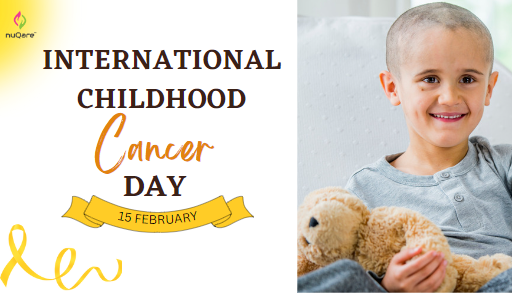15th of February is International Childhood Cancer Day (ICCD). ICCD is a global collaborative campaign to raise awareness about childhood cancer and to express support for children and adolescents with cancer, the survivors and their families.

Understanding Childhood Cancer
A cancer diagnosis is unpleasant at any age, but more so when the patient is a youngster. It’s normal to have a lot of inquiries, such Who should treat my child? Will my kid recover? What does this entail for our family, exactly?.Globally,every year, more than 400,000 children and teenagers under 20 receive a cancer diagnosis. The survival rate varies by geography, with an average of 80% in High-Income Countries but just 20% in Low and Middle-Income Countries.Childhood cancer is a term used to describe a collection of diseases that afflict children and adolescents, and it includes a wide variety of ailments such as leukaemia, brain tumours, and solid tumours
The WHO Global Childhood Cancer Initiative’s target goal is to end all pain and suffering experienced by children with cancer and to achieve a minimum 60% survival rate for all children worldwide by 2030.
Over the following ten years, this will save the lives of an extra one million children, about tripling the current cure rate.
What exactly causes Childhood Cancer?
About 5 % of childhood cancer is caused by some kind of genetic mutation passed on to children by their parents. Identifying the root cause of cancer is difficult in children because we cannot determine what children might have been exposed to early in their development. Certain unknown causes also affect childhood cancer. Some may have outside causes like radiation exposure, and others may have causes that have not yet been found. But many are likely to be the
result of random events that sometimes happen inside a cell, without having an outside cause.
About 6% to 8% of all cancers in children overall are caused by an inherited pathogenic variant (harmful alteration) in a cancer predisposition gene, although the percentage varies across cancer types. For example, about 45% of children with retinoblastoma, a cancer of the eye that develops mainly in children, inherited a pathogenic variant in a gene called RB1 from a parent. Children who inherit variants associated with certain familial syndromes, such as Li-Fraumeni syndrome, Beckwith-Wiedemann syndrome, Fanconi anemia, Noonan syndrome, and von Hippel-Lindau syndrome, also have an increased risk of childhood cancer.
Prevention and Early Detection & Coping with Childhood Cancer
Children’s cancers are not always treated like adult cancers. Pediatric oncology is a medical specialty focused on the care of children with cancer. It’s important to know that this expertise exists and that there are effective treatments for many childhood cancers. Advances in medical therapy and supportive care have substantially influenced the prognosis of children with cancer. Many cancer patients nowadays are effectively treated and go on to enjoy full and productive lives. However, much effort has to be done to enhance the quality of life for children with cancer and their families. Research suggests that we can take steps today to protect the health of babies and young children, and reduce their chances of getting cancer in the future.

